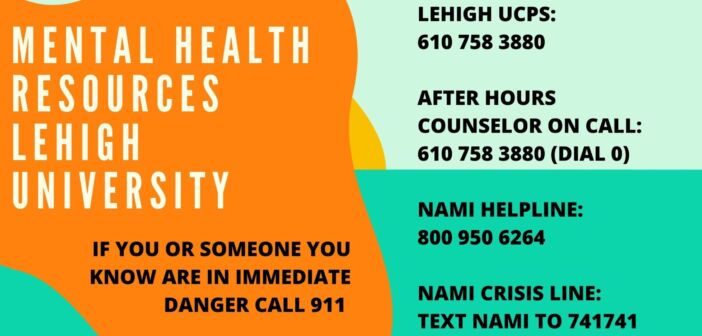Unable to return to his home in the Philippines last March, Adrian Suarez, ‘22, has spent the entirety of the coronavirus pandemic at Lehigh.
Within that timeframe Suarez spent over a month and a half alone.He developed deep anxiety and night terrors, an experience he described as true loneliness and helplessness.
Suarez’s experience depicts that of many others whose mental health has suffered as a result of circumstances due to coronavirus.
According to a University of Michigan Healthy Minds Network study, The Impact of COVID-19 On College Student Well Being, 40.9 percent of student respondents reported symptoms of depression since the pandemic’s onset, 30.5 percent reported mental health issues impairing their academics and 50.1 percent reported increased limitations regarding access to mental health resources.
According to a Philadelphia Inquirer article, college aged students, specifically first-year students, have expressed a greater need for mental health services following the onset of the pandemic.
The need is greatest for students in regions like rural Pennsylvania, in which more than 1.7 million individuals reside in areas with limited access to mental health care providers, according to the article.
For college students, specifically freshmen, social opportunities are minimal as many campus activities have been eliminated due to social distancing protocols.
Cary Karcher, ‘24, described the social climate on campus as “extremely limited.”
Karcher said he spends a lot of time trying to navigate campus regulations in order to socialize with the friends he has made on his floor.
Karcher said he knows multiple students who are not planning on returning back to campus next semester, as a result of the limited freedoms and threat of suspensions for social engagements.
“Not being able to go into one another’s rooms and buildings is really putting a hold on potential relationships,” Karcher said. “I’m going to return in the spring, but I know a lot of students who are talking about transferring.”
Upon the closure of campus due to coronavirus cases spiking earlier in the month, Karcher had resorted to meal times and pick-up basketball games in Bethlehem as opportunities to leave his dorm.
Karcher said his first-year experience without in-person class and not being able to sit in dining halls has been limiting and isolating.
“Nobody likes the situation of not being able to go get food and not go to the dining hall, the library,” he said. “People are really upset about it and Lehigh has not been handling it was well as they could have been.”
In fear of this, Gabriella Ledis,‘24, opted to stay at her home in California for the duration of the semester.
Ledis initially planned on coming to campus in August, but was unable to adequately coordinate her arrival due to Lehigh withholding their quarantine requirements until the end of July.
“I was registered for PreLUsion and my move in was supposed to be Aug. 17 because of it, but they sent out the email kind of late saying that people from hotspot states had to quarantine for two weeks, and I literally had to leave two days later if I wanted to make it to campus on time,” she said.
Despite beginning her college career remotely, Ledis has tried to meet other students through Camp Hawk and orientation. While she has made some friends through virtual programming, Ledis noted the social challenges of meeting new people from home.
“Being home and not being able to see people and have the actual college experience, it can get a little lonely, but I think I’m just focusing on trying to be on campus next semester and trying not to think too much into what I’m missing,” Ledis said.
In addition to social limitations, students have noted academic difficulties as a leading stressor and inhibitor of mental health.
“It’s harder than I thought, working from home, just because a lot of my classes are asynchronous work and we only meet once a week,” Ledis said. “I definitely feel stressed and anxious trying to teach myself in classes like math. It’s a bunch of asynchronous lectures and we have recitation and office hours, but it’s not the same as meeting someone in person and having them explain it to you.”
As a biology major, Karcher is enrolled to attend class in person, but due to campus closures he had to transition to remote learning.
“It’s just Zoom university,” Karcher said. “They give us a lesson to learn and a day to submit a PDF. I do everything by myself, and I have literally never met a single professor.”
Staff members at Lehigh’s Counseling and Psychological Services have noted the challenges that students of all ages are facing and have made an effort to prioritize the well-being of students by offering virtual resources.
Ian Birky, the director of Lehigh’s Counseling and Psychological Services, said the psychological well-being of all students remains the office’s main priority.
Birky noted the additional challenges faced by first-years who are being forced to adapt to ever-changing and unfamiliar circumstances.
“The town square doesn’t exist so much right now, and I think outside of the academics, they’re being pushed to adapt and accommodate to a very different social environment to create those friendships and those romantic intimate relationships,” he said.
Birky acknowledged the universal desire for first-year students to simply make friends and feel comfortable.
“There has to be so many first-years who would just love somebody to call them up, even if they just met once in the hallway and ask them to spend some time together,” he said.
In efforts to meet the needs of all Lehigh students and to combat the mental health implications of social isolation, the Counseling Center has transitioned entirely to remote sessions, both one-on-one and group.
Due to limited resources, Lehigh students are limited to eight counseling sessions before they are recommended to seek outside help.
Birky said this does not frequently present an issue to Lehigh students as most issues are resolved within four to six sessions, but the Counseling Center vows to never turn away a student in need.
“Students who absolutely need (services) and don’t have anything else, we’re going to do absolutely everything to help that student out,” Birky said. “I don’t think you are going to ever talk to a Lehigh student who will say, ‘I got turned away from the Counseling Center.’”
While Birky said Counseling Center client intake numbers are similar to those pre-COVID, he attests much of that to the students who have chosen to stay home and are therefore supported by family, friends and alternative therapy resources.
Birky noted the benefit of Lehigh counseling as a low-risk, low-cost introduction to therapy for students who are apprehensive to seek professional help.
Licensed clinical social worker and Lehigh parent Wendi Rothstein highlighted the importance for struggling students to talk to someone they trust and for Lehigh to ensure that students feel supported and heard.
“Provide some reach out and make sure that students know that the counselors are there for them to help them talk to and to help them through this,” Rothstein said. “Even the students off campus. It seems that there should be some communication about whatever it may be.”
Rothstein, who provides psychotherapy to individuals and couples, has noticed trends of increased stress and anxiety among her clients since the pandemic’s onset.
She attributed the trend to a combination of health and emotional stressors.
“The multitasking of families, work, extended family, someone who hasn’t been able to see their parents because they don’t want to risk the possibility of infecting them and loss of connection with people because they are being more isolated and more protective of who they see,” she listed.
Rothstein’s advice? Talk to someone.
“Keep searching to find someone to talk to, even if it’s not going to be face to face sessions,” she said. “Don’t give up and find it, because that’s going to make a big difference between those who can process this and navigate through it and those that don’t.”
Suarez, who sought out counseling services at the height of his anxiety-induced night terrors, coined coronavirus a “pandemic of loneliness.”
Months before the pandemic, Suarez received a scholarship to spend his summer studying abroad in Spain, South Africa and Argentina. Alternatively, he spent his summer on his own, stuck in university housing.
He said the pandemic was the first time he can remember, where he had more time than he knew what to do with. Suarez said his isolating months in quarantine forced him to face many personal issues head-on, including past trauma and abuse.
“I would have these moments where I would remember something in my childhood every time I would wake up in a full sweat, punching the air and cursing, but I was alone,” he said. “And I finally said, ‘Wow, this is not normal, and I need help. I can’t address this on my own.’”
Suarez said he benefited greatly from therapy sessions through Lehigh’s Counseling Center and now attends group sessions to continue to engage with other students.
He highlighted the importance of human connection to get through challenging times and urged struggling students not to isolate themselves when things get hard.
“You have to have that inner strength to know that you can’t do it alone,” he said. “We are social beings, and to really survive in this world, we need to be together and work together and figure out problems together. You need someone to rely on and other people need to rely on you.”
Suarez hopes others understand that no matter what they are facing, they are not alone. He said feeling sad is not abnormal, but a signal of a need that needs to be addressed, like hunger or thirst, and urged students not to be afraid of addressing that need.
“To seek help is the strongest signal of strength,” he said.
Birky echoed the strength of the campus community, noting that Lehigh students are uniquely resilient.
While he passionately encouraged all students to try therapy, he said he is constantly impressed with the strength presented by the student body.
“Lehigh students are so adaptive, accommodating, resilient and have grit,” he said. “That kind of defines so many of our students. Even though the world around you says, ‘My God, you’re so isolated, you’re so lonely, so overwhelmed and distressed by COVID …’ they forget that a lot of times 18-to-22 year-olds still have an energy and optimism and entrepreneurial aspect of themselves that allows them to flourish in almost any situation.”
To those struggling, Rothstein emphasized, there is no wrong or right about this circumstance.
The pandemic has forced us all to better understand ourselves and one another, she said, while noting the insurmountable challenges many have had to face throughout these past eight months.
“We develop strength that we didn’t know we had, we develop resilience that we may not have realized we have, “ Rothstein said. “Being able to go through this and come through the other side is going to give us a certain strength and certain skills that maybe we never would have imagined. But that doesn’t take away from how hard it is and how sad it is.”
Additional mental health resources can be found at https://studentaffairs.lehigh.edu/content/emergency-or-crisis-situation






Comment policy
Comments posted to The Brown and White website are reviewed by a moderator before being approved. Incendiary speech or harassing language, including comments targeted at individuals, may be deemed unacceptable and not published. Spam and other soliciting will also be declined.
The Brown and White also reserves the right to not publish entirely anonymous comments.